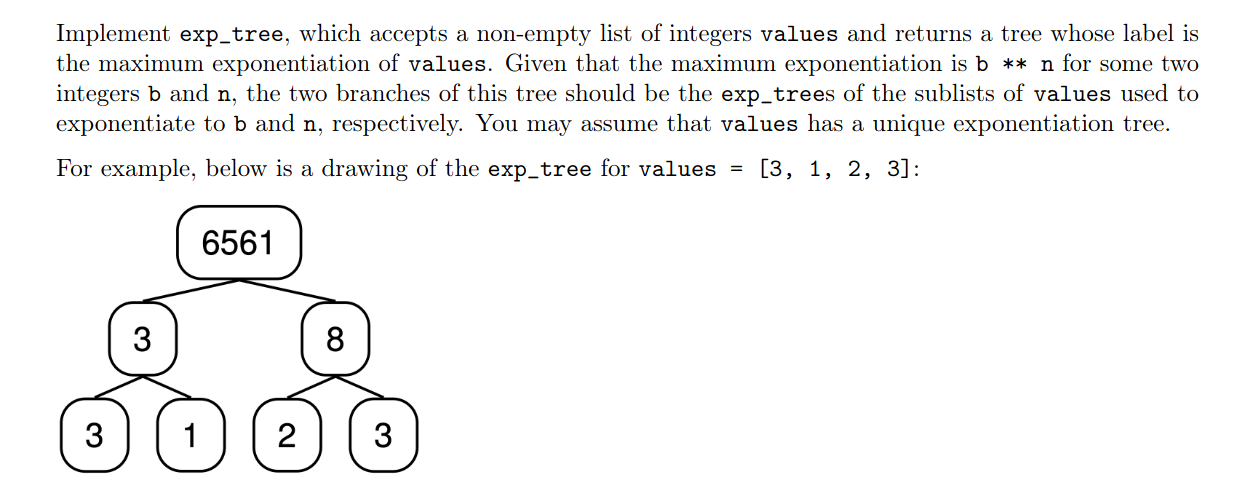Intro briefly
code links: ocaml_tree_implementation
I took CS61a about 4 years ago, a really good intro course for programmer/potential programmer. These day, I have been playing around with Ocaml, I would reimplement the tree structure and solve those questions that I scratched my head a lot to strength some basic knowledge in Ocaml. I will start with two most used/popular tree structure Binary Tree and more general tree:
(** Binary Tree *)
type 'a btree =
| Leaf of 'a
| Tree of 'a * 'a btree * 'a btree
(** General Tree *)
type 'a tree =
| Leaf of 'a
| Tree of 'a * 'a tree listStart with HW4

Start by implementing the structure for Mobile, Arms shoule have property len and connect to either a Planet or a Mobile and Mobile should connect to 2 Arms therefore, the design of data struture would be like this(A good example of using mutually recursive types here):
type 'a arm = 'a * 'a mobile
and 'a mobile = | Planet of 'a | Mobile of 'a arm \* 'a arm ;;PS: We do have to define getter and setter for each type as we have ADTs and could make use of pattern matchings which simplify things a lot.
And then it comes Q1
(** Return the total weight ofm, a planet or mobile. \*)
let rec total_weight = function
| Planet x -> x
| Mobile (left, right) -> (arm_weight left) + (arm_weight right)
and arm_weight arm =
let _, connected = arm in (total_weight connected) ;;then, Q2
let balanced = function
| Planet _ -> true
| Mobile ((len_l, rod_l), (len_r, rod_r)) ->
len_l * (total_weight rod_l) = len_r * (total_weight rod_r)with pattern matching, things become way clearer.
When it comes to Q3, things finally become more related to tree:
- we should define
print_treefirst, as mobile is a binary tree, first give the definition of how to print a binary tree:let print_tree t = let open Core in let repeat_str n str = let rec repeat_tail sum = function | 0 -> sum | x -> repeat_tail (sum ^ str) (x-1) in repeat_tail "" n in let rec print_w_indent indent = function | Leaf a -> print_endline ((repeat_str indent " ") ^ (Int.to_string a)) | Tree (v, left, right) -> print_endline ((repeat_str indent " ") ^ (Int.to\_string v)); (print_w_indent (indent + 2) left); (print_w_indent (indent + 2) right); in print_w_indent 0 t;;
Ocaml does not come with easily-used string concatenation like "str"*n in python, have to define one ourselves either use tail recursion or String.concat (List.init (fun _ -> str) n)
- The
totals_tree:let total_trees t = let open Btree in let rec con_sum_tree = function | Planet x -> Leaf x | Mobile ((_, rod_l), (_, rod_r)) as x -> Tree ((total_weight x), (con_sum_tree rod_l), (con_sum_tree rod_r)) in con_sum_tree t;; ;;
More Tree Questions
let rec replace_loki_at_leaf t lokis_replacement=
match t with
| (Leaf a) as l ->
(if a = "loki" then (Leaf lokis_replacement) else l)
| Tree (v, trees) ->
Tree (
(if v = "loki" then lokis_replacement else v),
(Core.List.map ~f:(fun x -> replace_loki_at_leaf x lokis_replacement) trees)
)
;;When it comes to general trees, the way we handle trees should be different as a list is used instead of a tuple.
let has_path t word =
let rec rec_search acc = function
| Leaf x -> (acc ^ x) = word
| Tree (v, trees) ->
let concat_ = acc ^ v in
(concat_ = word) || (Core.List.fold trees ~f:(fun acc x -> (acc || (rec_search concat_ x))) ~init:false)
in rec_search "" t This one is the hardest one in the questions set, require to use fold over a recursive function, and we want to use tail-recursion here as well as ||to make sure we could exit the program earlier when condition satisfied.
Harder Trees
The previous examples are overall easy if you are familiar with recursion, I try a harder one from cs61a 21summer midterm, call Maximum Exponen-tree-ation:

I will start with calculate the max exponential value:
let largest_exp = function
| [] -> 1
| hd :: tl ->
let rec largest_val acc = function
| hd :: tl -> Int.max (largest_val (acc ** hd) tl) (acc ** (largest_val hd tl))
| [] -> acc
in
largest_val hd tlBut if you want to constructure the tree, and compare the node of the tree, List is not an good option, as you want to break this down into smaller problems:
- find Base and Exponent buttom up
- start by dividing array into subarrays, the first stands for base, the second stands for exponent.
- use
Array.mapto split list for value from 1 toArray.length a - 1.
The code is shown below:
let rec largest_exp_tree a =
if Array.length a = 1 then (Leaf (Array.get a 0))
else
let tree_at_split i =
let base = largest_exp_tree (Array.sub a ~pos:0 ~len:i) in
let expon = largest_exp_tree (Array.sub a ~pos:i ~len:((Array.length a) - i)) in
Tree (((get_label base) ** (get_label expon)), base, expon)
in
let subts = Array.map ~f:(tree_at_split) (Array.init ~f:(fun x -> x+1) (Array.length a - 1)) in
(Option.value_exn (Array.max_elt subts ~compare:(fun a b -> (Int.compare (get_label a) (get_label b)))))
;;Summary
Ocaml really give coders and readers a good experience in terms of readibility and simplicity, The errors are also easy to identify, not so easy to debug for me tho🙃. Some coding style I may consider use $ and @@ to avoid more parenthesis.
Updated…
The use of List or self-defined ADT are bug-free inclined, and error message is easy to identify, but when you use Array and slice is involved, the error message is just messy, hard to debug.
